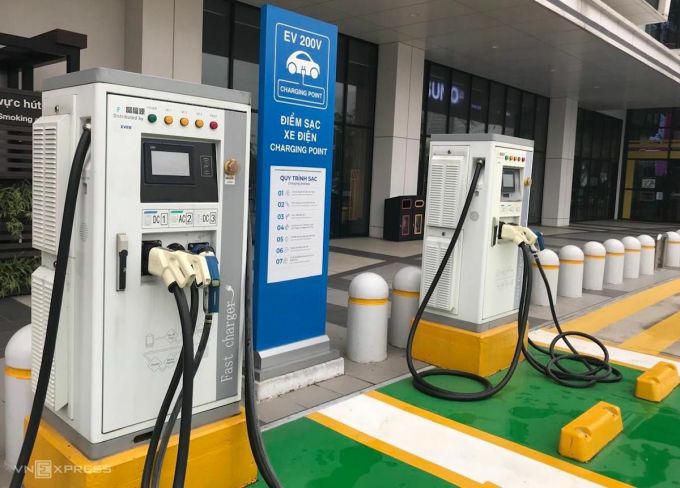The government needs to address three major challenges to the development of electric vehicles in Vietnam – rising power demand, insufficient infrastructure and high prices, experts say.
The first challenge to the development of electric vehicles is the continuously increasing power consumption, said energy expert Nguyen Quoc Khanh.
Each year, an average of 5.14 million motorbikes and 255,000 cars were registered between 2014 and 2020. Transport energy consumption accounted for 21.4 percent of the national energy consumption in 2014 and increased 4.9 percent in the 2014-2019 period, he said at a meeting held last week.
If electric motorbikes account for 34 percent of total sales of motorbikes of all kinds, and electric cars 30 percent of the total by 2030, power demand in the transport sector will be nearly 4 billion kWh. By 2050, power demand in the sector will rise to 17.6 billion kWh, he noted.
At present, Vietnam has few policies on developing electric motorbikes and cars, and their current prices are higher than those of vehicles powered by fossil fuels.
According to data from the Vietnam Automobile Manufacturers Association (VAMA), in 2020, net production costs of electric vehicles are about 45 percent higher than vehicles using internal combustion engines. Along with better and cheaper battery production technologies, by 2030, the price of electric vehicles will decrease, but will still be 9-10 percent higher than those that run on gasoline and diesel.
To date, electric vehicles have enjoyed a special consumption tax rate of 15 percent, compared with 35-50 percent for to gasoline and diesel vehicles.
The government is proposing to amend the Law on Special Consumption Tax to reduce excise duty by 5-12 percentage points for battery operated electric cars in the first five years.
However, experts say just lowering excise tax rates is not enough. Dao Cong Quyet of VAMA said that the government needs to offer tax and fee incentives to stimulate demand for at least the first 10 years; and have policies to support the development of charging stations. These incentives can gradually decrease when electric vehicles have a certain share of the market, he said, adding that separate support policies might not be needed after 2050.
“In the first phase (2021-2030), due to insufficient infrastructure in Vietnam, supportive policies should prioritize plug-in hybrid electric vehicles to ensure a smooth transition to battery operated electric vehicles,” he said.
 |
|
A fast charging station for electric cars at a shopping mall in Hanoi. Photo by VnExpress |
A plug-in hybrid electric vehicle is a hybrid electric vehicle whose battery pack can be recharged by plugging a charging cable into an external electric power source, apart from getting internally charged by its on-board internal combustion engine-powered generator.
Insufficient infrastructure for electric vehicles such as power sources, charging stations, battery and battery treatment is also a big problem.
Electricity expert Nguyen Duc Tuyen said that besides 200 charging stations of local electric vehicle manufacturer VinFast, there is almost no infrastructure for electric vehicle development in Vietnam.
“The growth of vehicle charging infrastructure is the core of electric vehicle development. If there is no specific charging station planning in relation to the power grid infrastructure, especially a low-voltage grid to connect to fast charging stations, transformers may get overloaded, making the electrical system unsafe,” Tuyen said.
Tuyen said the proportion of renewable energy in Vietnam’s power system is set to increase from over 11 percent now to 30 percent by 2030 and 42 percent by 2045, so the country should take advantage of this power source for promoting the development of electric vehicles. Vietnam can only achieve low greenhouse gas emissions if it focuses on developing renewable energy sources and supplying clean energy to electric vehicles and charging stations, he said.
Tran Quang Ha, deputy director of the Science and Technology Department under the Ministry of Transport, said the ministry will develop battery standards for electric vehicles next year. “We are trying to perfect quality control…and to put forth appropriate tax and fee policies to have a roadmap for switching to battery operated electric vehicles,” he said.
- Reduce Hair Loss with PURA D’OR Gold Label Shampoo
- Castor Oil Has Made a “Huge” Difference With Hair and Brow Growth
- Excessive hair loss in men: Signs of illness that cannot be subjective
- Dịch Vụ SEO Website ở Los Angeles, CA: đưa trang web doanh nghiệp bạn lên top Google
- Nails Salon Sierra Madre
 VnExpress News The News Gateway of Vietnam
VnExpress News The News Gateway of Vietnam




